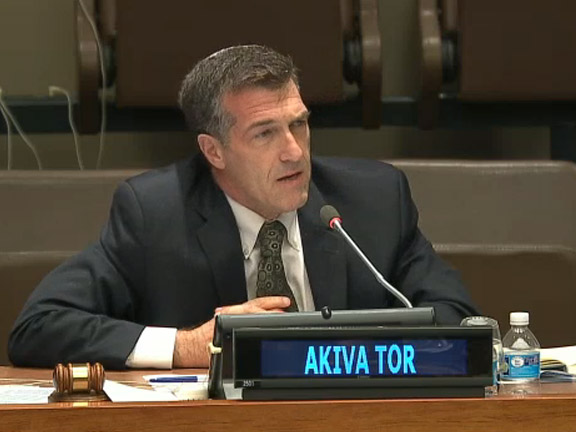Forum on Global Antisemitism - MFA address to the panel on Government Responses to Global Antisemitism
-
-
9/14/2016
GovXShortDescription
Akiva Tor, Head of the Bureau for World Jewish Affairs and World Religions: In our view, one of the most egregious problems where the international community is actually capable of taking steps is connected to severe and dangerous hate speech on the web.
-
-

 Akiva Tor, Head of the Bureau for World Jewish Affairs and World Religions, addressing the panel on Government Responses to Counter Antisemitism
Copyright: UN webcast
Akiva Tor, Head of the Bureau for World Jewish Affairs and World Religions, addressing the panel on Government Responses to Counter Antisemitism
Copyright: UN webcast
|
GovXContentSection
On September 7, 2016, the Missions of Canada, Israel, the United States, and Delegation of the European Union to the United Nations, jointly hosted a full day forum on global Antisemitism.
Four separate interactive panels considered different factors related to Antisemitism around the world, including: government responses to counter Antisemitism, social media and the Internet, civil society coalitions, and youth and education.
Following is the address delivered by Akiva Tor, Head of the Bureau for World Jewish Affairs and World Religions of the Ministry of Foreign Affairs to the panel on government responses to counter Antisemitism:
Appreciation to the UN for hosting this vital seminar, and to the permanent delegations of Israel the US, EU and Canada which worked so hard to organize it.
This is an expression of the deepening recognition that the rise in antisemitism globally is a threat to the common good everywhere.
For the Government of Israel, the main emphases regarding combating antisemitism have shifted markedly in recent years.
Four or five years ago, I would have reported that our major concerns were the neo-Nazi movements in Europe, Euro-Asia and the US, Holocaust denial by groups of the far right, and attempts, primarily in Europe, to legislate against practices of the Jewish religion - such as brit milah male circumcision and kosher slaughter.
These issues are still relevant and essential, but have shifted somewhat into the background due to even more pressing concerns.
The issues which most concern the state of Israel today relate to the physical safety of Jewish communities in Europe, but also elsewhere.
In our view, one of the most egregious problems where the international community is actually capable of taking steps is connected to severe and dangerous hate speech on the web.
I refer not to offensive or even hateful speech, and certainly not to "microaggresions, trigger warnings" - but to truly dangerous speech, incitement of a form which enables and lays the groundwork for physical attacks. On this issue, Israel finds itself in strong agreement with several democratic governments of the larger states in Europe, and frankly in a somewhat philosophical disagreement with some of our close friends. We believe with deep conviction in the protection of free speech, but we are not in full agreement about that which is not tolerable, because it is simply too dangerous to ignore.
Essentially - we would like to see the internet industry exercising greater self-regulation, along the lines of its own code of conduct. We would like to see a clear and agreed industry standard, and global terms of service for prohibiting the posting of particularly virulent and dangerous hate speech.
This global code of social media conduct, ought to be clearly posted, and we would like to see the onus of maintaining these standards move to the industry acting on its own, through the development of strong detection tools, rather than this being the sole responsibility of the community of users by their filing of complaints.
It is our view that Holocaust denial sites should not be on the web, but in any case should certainly not show up on web searches generated by the popular search engines.
And we believe that governments should adopt stronger laws and penalties for the prohibition of internet materials promoting terrorism and supporting recruitment to terrorist groups.
We also believe in the need for an agreed working definition of antisemitism - so that governments and civil society can monitor more effectively, and educate better, and that law enforcement can be trained to identify anti-Semitic manifestations when they are happening.
The defense of the Jewish communities by governments, in particular in Europe, needs to be proactive, so that Jewish life need not be forced to take place only behind high walls. Unless this happens, Jewish communal life will not remain long remain optimistic and robust.
Finally - we are concerned about the growing popularity of parties of the extreme right in Europe and in other parts of the world. Often these parties claim to have shed their anti-Semitic histories - but we remain deeply skeptical, and as always anti-Semitic sentiment is the canary in the cave warning against the more general assault on liberty, freedom, personal and societal rights and the dignity of humankind.
Thank you.
-
-
-
-
-
-
-
-
-
-
-
-
-
-
-
-
-
-
-